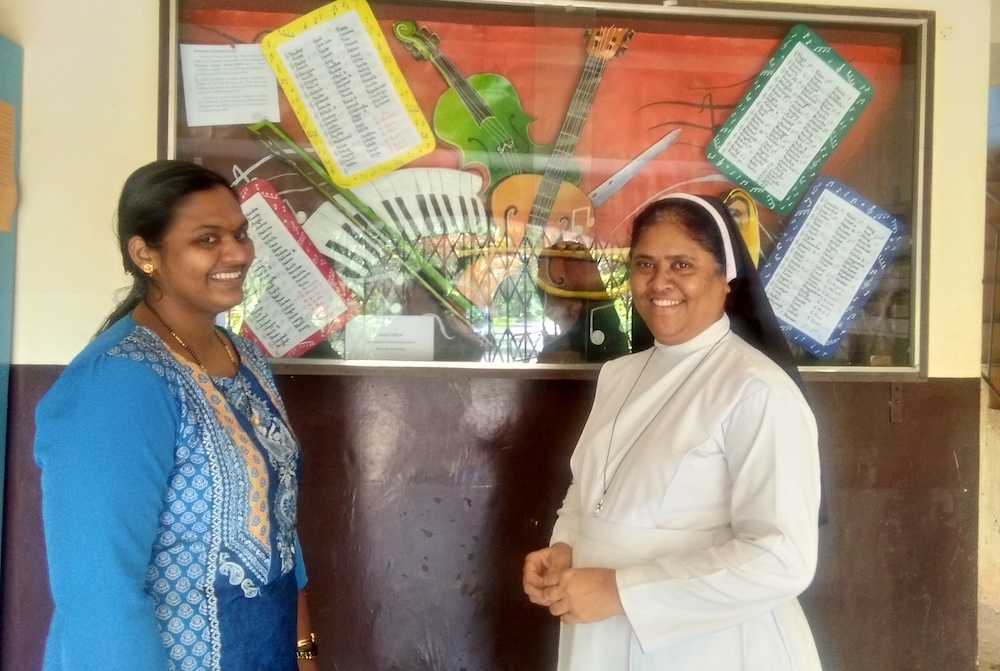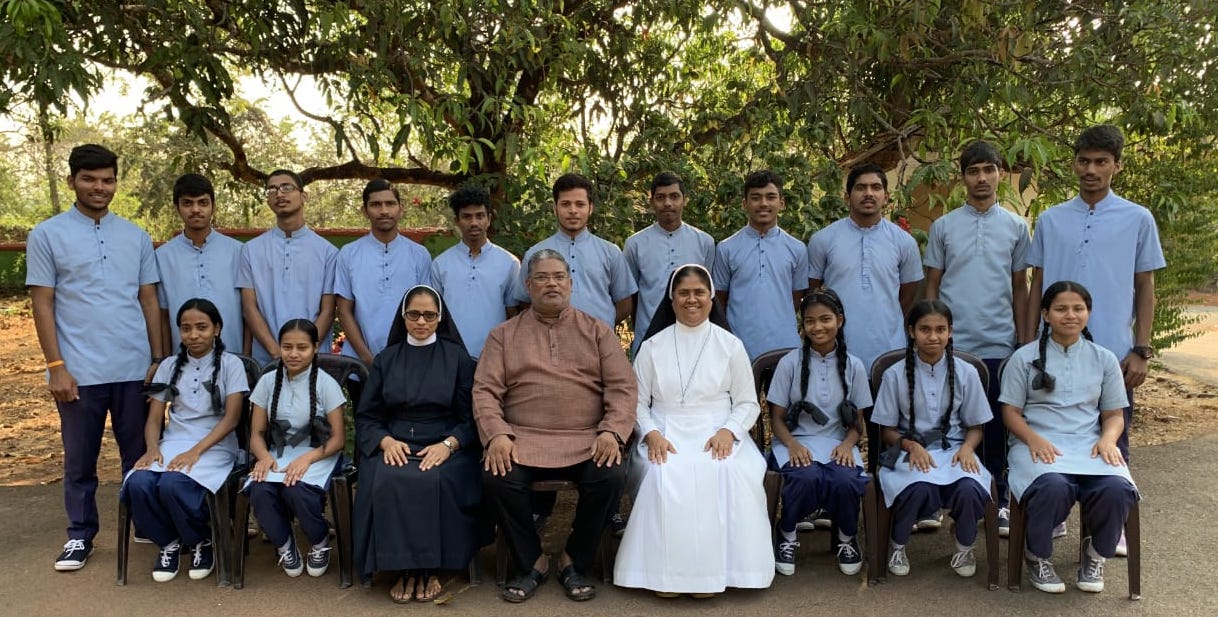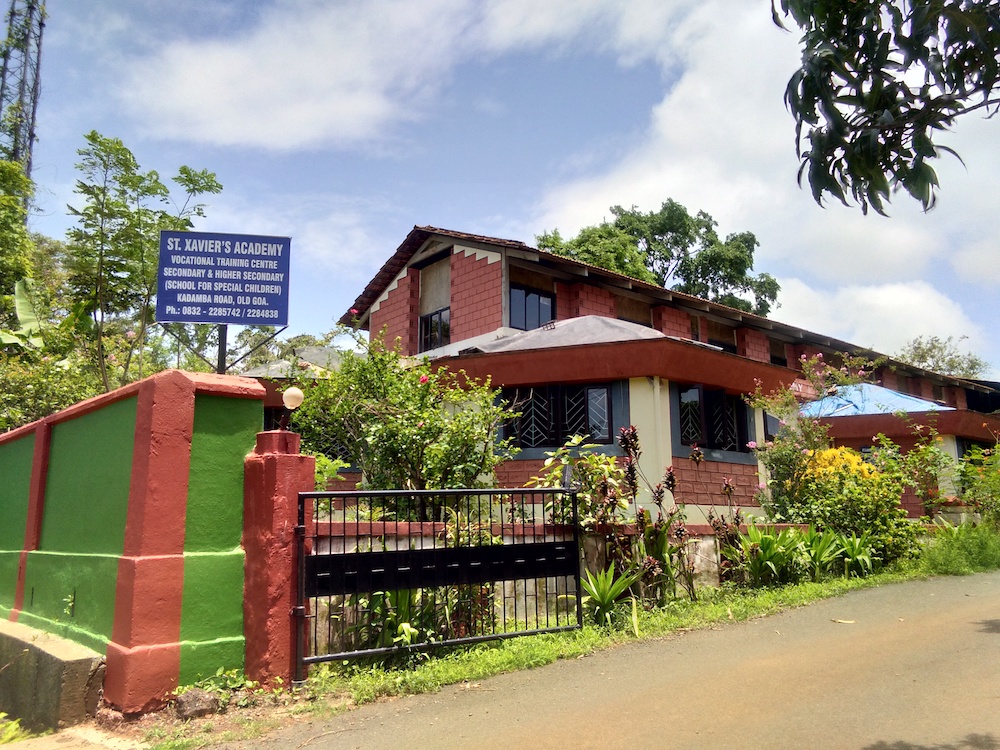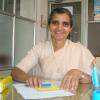
Sr. Meena Dias, a member of the Sisters of Holy Family of Nazareth, right, with Vandana Kawlekar, a staff member at St. Xavier's Academy, which cares for children with disabilities in Old Goa, ancient capital of Portuguese Goa (Lissy Maruthanakuzhy)
Sr. Meena Dias, a member of the Sisters of Holy Family of Nazareth, is adept in training differently abled children. In 1991, she started serving St. Xavier's Academy in Old Goa, an institution under the Archdiocese of Goa and Daman.
Dias was the first member of her congregation selected to study special education to serve people with disabilities. When she joined the school, it had about 50 students. Now, it has become a higher secondary school (up to 12th grade) and has more than 250 students. Her indigenous congregation, based in Goa, western India, has taken over the management of the center from the archdiocese.
She shared with Global Sisters Report what her work among children with disabilities has taught her.
GSR: How did you enter this field of special education? How do you find it now?
Dias: Soon after my first commitment, the superiors asked me whether I could do training in special education to serve differently abled children. At first, I was hesitant. How will I manage? I thought. I had visited this school once during my novitiate. However, I took the opportunity and completed my bachelor's degree in education with a specialty in special education.
In 1991, I joined the academy, then known as St. Francis Xavier Training and Production Centre. It was started in 1973. When I joined the academy, it was serving people with hearing and speech impairment. Gradually, children with autism, low vision, and physical and other disabilities joined the school.
I am grateful to our former superior general, the late Sr. Mary Jane Pinto, who added meaning and purpose in my life by choosing me for this mission. I feel good now.
How did the training help you?
I believe disability is an opportunity that requires special methods to educate differently abled students. My training and experience helped me to develop innovative teaching techniques in sign language and cued speech to improve communication skills. The training also helped me guide teachers to write lesson plans to draw out the best from the students.
Advertisement
Could you share about this unique mission?
Special educationists have a double task. We have to build the confidence not only in children, but also in parents. Generally, parents understand disability as a problem, not as an opportunity. It is a challenge for those in education to convince the parents about the abilities and capacities in their children with disabilities.
Amazingly, once they admit them in the school, the expectations of the parents for their children become very high. They look for immediate changes in the children's behavior. Some get frustrated when this expectation is not met quickly. We know that to bring to light the dormant talents within one child requires patience and endurance.
At first, the school had only hearing-impaired students. My role as a special educator then was to assess the need of every child and build self-confidence to achieve what they sought. It was a process of learning for me trying to understand the desire of the hearing-impaired children who showed great interest to communicate through speech.
What are the joyful moments you face in this mission?
I felt my dream fulfilled when a group of hearing-impaired students presented a birthday song. I had spent much time and energy in training them to sing. It was a moment that assured me our dreams will actualize when we work on it with faith.
I have spent 29 years with children with hearing impairment, learning disabilities, Down syndrome; children who are orthopedically challenged and with intellectual disabilities; and children with autism. It is a great feeling to realize that these children have built self-confidence living in a positive frame of mind.

Sr Meena Dias, front row, in white, with Fr. Maverick Fernandes, director of Caritas, Goa and Sr. Monica Coelho, front row, in black, headmistress of St. Xavier's Academy in Old Goa, with their students (Provided photo)
It is a matter of pride to know that some children have become the only breadwinners of the family. They independently lead a happy, married life and take good care of their parents. Some have good jobs, and a few work on cruise ships. There are some who work in banks. Some have set up their own businesses. Some girls have set up their own tailoring shops and take care of their parents.
Please share some creative activities you engage in with the students.
Our ingenious activities include creating wealth out of waste, gardening, training them for singing in choirs. They have been singing patriotic songs and carols. I have also prepared and accompanied them for interschool competitions in different states of India. Many have traveled out of India to Ireland and China for sports and have won awards.
Taking students on field trips, social gatherings and interschool activities enables them to face a greater world and prepare themselves to lead a life with dignity and self-confidence.
We also train them in household activities like cooking, maintaining health and hygiene, and other day-to-day functioning skills. We also armor them to face life with valuable education and spiritual programs. We focus on overall development of the child. That has paid off.
You received a teaching award from Goa Chief Minister Pramod Sawant. What does it mean to you?
It is a sign of recognition of my work in this mission, but more than that, it is the recognition of the involvement of the church's concern for special people. It also means respect shown to the importance of special education and the special abilities of the people who would have been left to the care of their own families.
When I joined the school as a teacher trained for this mission, I spent time with the students. I began loving them. This award makes me feel proud, elated and motivated to do more. I look forward to many more years of service.
What are the challenges you have encountered?
We have to always go through the struggle to achieve something of worth in life. There is always victory after the struggle. In our mission, one has not only to be a teacher, but a mother first.
We do not get much cooperation from parents. That is because they themselves are ignorant or they are not educated.
Is there anyone else from your congregation working with you?
Sr. Monica Coelho, the headmistress of the school, is from my congregation. Our congregation took charge of the school in 1992. Sister Monica is trained in managing different types of differently abled children. Both of us with 20 teachers form up the staff to train our 250 students. We have also 150 hostelers from poor families in villages. The school is aided by the Goa government.
What message do you have for the youth who want to enter religious life, especially in the background of so many scandals involving nuns and priests?
We have consciously made a choice to become religious. No one has forced us. One has to be fully committed to the life chosen and face the challenges that life brings.
We are here to serve the Lord and his people. When we find mistakes or weaknesses in another's life, it is better to refrain from criticism but pray for that person. As someone has said, it is better to light a candle than curse the darkness. Trying to see the good done by others is helpful. Religious are doing a lot of good in society. Sadly, everything is pushed behind when someone makes a mistake.
Courageous women with strong willpower will continue to join religious life.

St. Xavier's Academy in Old Goa, Goa, where Sr. Meena Dias, a member of the Sisters of Holy Family of Nazareth, has been working for almost 30 years (Lissy Maruthanakuzhy)
[Lissy Maruthanakuzhy is a member of the worldwide Congregation of the Daughters of St. Paul in India and a correspondent for Matters India, a news portal that collaborates with GSR and focuses on religious and social issues.]







